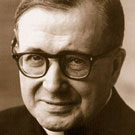I’m pretty literal. I prefer prose to poetry, and to a lesser extent I prefer non-fiction to fiction.
Hence — like the apostles I might add! — our Lord’s parables often have me scratching my head.
Jesus said to the crowds, ‘The kingdom of heaven is like treasure hidden in a field which someone has found; he hides it again, goes off happy, sells everything he owns and buys the field.
‘Again, the kingdom of heaven is like a merchant looking for fine pearls; when he finds one of great value he goes and sells everything he owns and buys it.’ (Mt 13:44-46)
What the heck does that mean? Scripture scholars wax lyrical about the kingdom being “now-and-not-yet,” “in the present but in the future,” yada yada yada. That’s true, but it’s also harder to make sense of than the parables themselves!
I like contemplating the saints. In the words of Pope St Gregory the Great, “Viva lectio est vita bonorum.” (My Latin isn’t great, but what I think that means is that when we read the lives of the saints, we read the Gospels, alive in a particular place and time. “The Living Word is the life of holiness.”)
The saints, it seems to me, thought about Heaven a lot. It’s the natural fruit of a deep and abiding love. A profound desire to be with God.
For to me, to live is Christ and to die is gain. If I am to go on living in the body, this will mean fruitful labor for me. Yet what shall I choose? I do not know! I am torn between the two: I desire to depart and be with Christ, which is better by far; but it is more necessary for you that I remain in the body. (Phil 1:21-24)
St Paul might have coined those words, but I bet he wasn’t the first saint to think along these lines, much less the last.
It’s good for us to imagine Heaven — and to plan for it, like the guy who finds the treasure in the field, or the pearl of great price. Not in a self-pitying way, which despairs of life. But in an excited sort of way, like children counting down til Christmas, who are still doing the work of Christmas preparations in the meantime!
How does one imagine Heaven? “What no eye has seen, nor ear heard, nor the heart of man conceived . . .” (1 Cor 2:9) That’s Paul again, quoting Isaiah. How can we imagine that? I’m asking a lot of questions right now, and not fielding many answers.
Here’s my advice: imagining Heaven is a great way to pray, which can foster a deeper desire for union with God. A deeper love for Jesus.
Sometimes when I’m driving long distances and I’m too tired to pray the Rosary — or I’ve prayed it already — I play this song again and again. It’s an oldie (1999), but a goodie.






I really the song and am wondering if is possible to buy a copy today. Love the article John. Well done. Helen
Yeah. It’s good, isn’t it? I have it on CD. I’ll bring it with me next time I’m in Warrnambool!
Hi Fr John,
Yes, it is definitely sweeter to depart and to be with Christ but it is absolutely necessary for us to live in this world and to accomplish His holy Will.
For to me, to live is Christ and to die is gain. If I am to go on living in the body, this will mean fruitful labor for me. Yet what shall I choose? I do not know! I am torn between the two: I desire to depart and be with Christ, which is better by far; but it is more necessary for you that I remain in the body. (Phil 1:21-24)
Paul’s quote is really getting a work out. I just used it again in an article for the local newspaper! 🙂
Fr, one interpretation of those parables I was told recently, and which I find convincing, is that in fact the person who buys the field with the treasure, and the merchant who buys the pearls, is Jesus Himself, and we are the treasure for which he “sells everything he owns”. It does bring home the enormous implications of what God has done by humbling Himself and becoming Man, and also what Christ’s ultimate sacrifice means for us.
I like that. And I’ll remember it. Thanks brother.